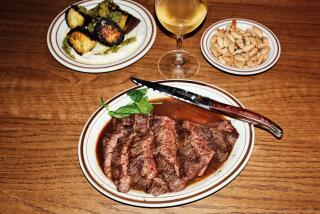What’s Brewing in Valley? Japanese Beer
- Share via
VAN NUYS — Kirin is a malty Japanese beer that loyalists find as fitting with sushi as with a cut of Kobe beef.
But take a close look at that label. Kirin is brewed and bottled at the Anheuser-Busch plant in Van Nuys, in the heart of the San Fernando Valley.
The alternative--shipping Kirin across the Pacific--would reduce freshness while raising the cost substantially, company officials say.
“Some people may have a need to drink something that comes from another place,” said Randy Higa, marketing manager for Kirin Brewery of America. “But the Kirin you’re getting here is fresher. We’re trying to make it as close as possible to the beer in Japan and it allows us to be more cost competitive.”
Under an agreement with Anheuser-Busch, Tokyo-based Kirin has been making beer at the Van Nuys brewery since 1994. Kirin started with an ice-style beer it exported to Japan. Under another agreement, Kirin began brewing three brands for North and South America in 1997.
Kirin uses Anheuser-Busch water and employees, who work under the supervision of Masa Yoshida, Kirin’s brew master in Van Nuys.
Yoshida said there’s not much difference between the Kirin brewed in Van Nuys and the beer the company makes in Japan.
“[There’s] a little bit of difference because the equipment they [Anheuser-Busch] have is different from Japanese equipment,” he said. “Actually, the taste is very close.”
Yoshida said the main difference in ingredients between Anheuser-Busch and Kirin beers is the imported German and Czech hops, a special variety of barley and a proprietary yeast. Kirin also uses lower temperatures during the fermentation and lagering processes.
From beginning to end, the 34-year-old Osaka University graduate remains in close contact with Tokyo headquarters, fielding daily e-mails from company officials who in turn closely monitor brewing data.
As part of ongoing efforts to ensure quality, Yoshida ships two cases of Kirin brands to Japan for tasting and analysis each month. Water and ingredients such as rice, corn and barley are sent home four times a year.
Such scrutiny is important for Kirin, which is sold primarily in Asian restaurants, retail grocery chains and small liquor stores, say company officials.
“We don’t have to send a brew master over,” said Higa. “But the fact that we do shows quality is the most important thing.”
Kirin is brewed weekly in special tanks outfitted with cooling jackets. The company alternates batches of packaged and draft beer--one week brewing bottled and canned beer that is pasteurized, and the next week brewing draft beer that is shipped cold in kegs to retailers.
Combined draft, bottled and canned beer output is the equivalent of 1.3 million cases a year. By comparison, the brewery produced the equivalent of 165 million cases of Anheuser-Busch products, including Budweiser and Michelob.
The Kirin Lager, Light and Ichiban produced at the plant are most popular in Southern California, followed by Hawaii, the Bay Area and New York.
Industry analysts say more breweries are discovering the advantages of teaming up for brewing, marketing and distribution.
Even so, large breweries such as Heineken, Carlsberg and Guinness still export to the U.S., according to Michael Bellas, chairman of New York City based Beverage Marketing Corp. For those brands, he said, part of their appeal in the U.S. is that they are imported. But elsewhere in the world, beer companies, including Guinness and Heineken, have local breweries produce their product.
Bellas said that as part of this effort to reach distant markets, bigger companies are dispatching their own experts to oversee production on foreign shores.
“As more and more brewers are globalizing, you will see quality control become a more important issue,” said Bellas. “And also see more quality-control people on site from the parent company.”
Yoshida, for example, works out brewing schedules with Anheuser-Busch, inspects the hops, keeps close tabs on temperatures during the cold-brewing process and keeps watch over Kirin’s proprietary yeast, which is housed in a special room within the plant.
But with each batch, he also must work with Anheuser-Busch employees to ensure instructions are carried out.
Yoshida, who commutes from the Century City residence he shares with his wife and young son, said he was surprised that after 10 years at Kirin he was dispatched to Van Nuys.
Once here, building a routine took longer than he expected because of both cultural differences and language.
Still, if there is a cultural barrier, his American co-workers in Van Nuys say it doesn’t interfere with making the product.
“We call him Masa-san, which is actually the formal way of addressing a Japanese professional,” said Dennis Owens, business manager for the Van Nuys Anheuser-Busch brewery. “We treat Masa-san as a co-worker in every way and we work as a team.”
More to Read
Eat your way across L.A.
Get our weekly Tasting Notes newsletter for reviews, news and more.
You may occasionally receive promotional content from the Los Angeles Times.










